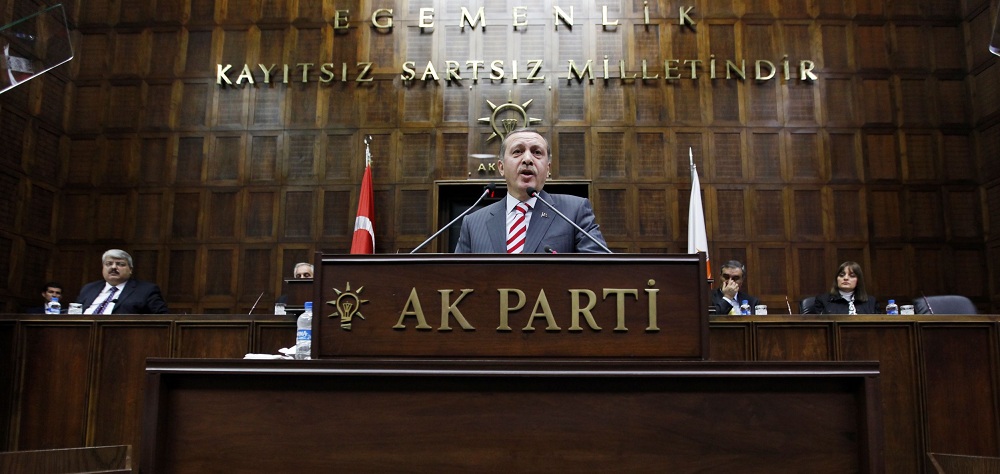Alwaght- Divisions inside Turkey’s ruling Justice and Development Party (AKP) is revealing more day by day, with various figures inside the party increasingly taking stances against President Recep Tayyip Erdogan. According to the London-based Arabic-language Rai al-Yaum newspaper, Ahmet Davutoglu, the former prime minister of Turkey, during his speech at the 18th anniversary of AKP's foundation last week said that very soon all will learn that June 7 to November 1 of 2015 were the toughest and most dangerous political times of the country’s history.
Prominent figures make revelations
In the latest speech, Erdogan has named those separated ways from him and the party “traitors.” He accused them of trying to split the country by breaking with the party. To curb them, he threatened that he will reveal their detailed information accessible to the party at a suitable time. A couple of days later, Davutoglu attacked Erdogan telling him if “I reveal some aspects of the counter-terror fight, many will not dare to look at the people’s faces for the severity of the shame. In the name of launching the peace talks, they destroyed Turkey’s order. Between the two elections of 2015 important events took place all worthy of attention and inspection.”
Davutoglu appears to refer to the events in the 2015 parliamentary elections that led to the defeat of the Kurdish parties including the People’s Democratic Party (HDP) that led to it losing 21 seats in the Grand National Assembly.
Nine members of the HDP, including the leader Salahettin Demirtas, were arrested in the same year after Erdogan and his party accused them of helping terrorism in Turkey. Erdogan argued the Kurdish party was the political wing of the Kurdistan Workers’ Party (PKK), a militant organization labeled terrorist by Ankara. Davutoglu was one of the popular figures of the AKP and a mastermind of it in the politics and promoting the “strategic depth theory” in the region. He rose to prominence beside Erdogan as the promoter of neo-Ottomanism in the country’s politics. His popularity set off the alarm bells to Erdogan, however. Their cleavage initiated from the 2015 parliamentary election. Davutoglu argued that AKP’s failure to win an outright majority in the election was a sign the people did not favor a presidential political system. Such a notion was a red line for Erdogan. At the time, Davutoglu believed that a coalition government with other parties needed to be formed. Erdogan rejected the idea and favored forcing his rivals out of the competition setting.
Division inside the AKP
The AKP mixed some elements of liberalism with the pro-justice Islamic discourse which already had a Muslim Brotherhood ideology to both reintroduce the traditional Turkish identity and curb the economic challenges, poverty, and unemployment. Mixing paradoxical identities into a unified body, the AKP won the 2002 elections and turned into a party conservative in religion, pro-democracy and development at home, pro-European in foreign policy, and regionalist and pro-open market in the economy. The climactic point of the Turkish economic prosperity was between 2002 and 2010, during which the government considerably quelled inflation and unemployment.
The current conditions in the country are reminiscent of the conditions between 1997 and 2002 in which by a peaceful coup the military forced Necmettin Erbakan, prime minister and leader of the Welfare Party, to step down. His critics argued that Arbakan was self-centered in his decisions and sought no consultations. Erdogan and Abdullah Gul, both pupils of Erbakan, later rose to fame as the leading figures of the newly-founded AKP. The AKP showed signals of decline gradually. In October 2015, Bulent Arinc and Huseyin Celik, both senior members of the party, were accused of links to Fethullah Gulen, a US-based opponent to Erdogan, and were expelled from the party. Ali Babacan, AKP’s economy czar, finally resigned from the party in July after long disputes with Erdogan. He said that his resignation was motivated by “deep divisions in principles, values, and stances” with the AKP. Yasar Yakis, first AKP foreign minister and one of its founders, withdrew his membership in the party four years ago. Shortly before, Abdulattif Sener, the former deputy PM, and Dengir Mir Mehmet Firat, both founding members of the party, quitted the party as they protested Erdogan’s policies. The defections raised the idea of the foundation of a new party.
Ahmet Takan, an official at Yeni Ucak newspaper, in late March noted that he gained information from sources close to Gul that the AKP defectors plan a new party led by Babacan. Some sources said that another party, likely to be named Huzur Party, will be founded by Davutoglu. Although there are doubts upon the success of the new party, in the new conditions and AKP loss in municipal elections in Ankara, Istanbul, and Izmir, Davutoglu will act in a way that he will be not accused of betraying the AKP nor founding a weak party. He is assessing the opposition parties and has initiated work with criticizing Erdogan in an effort to win popularity among the opposition.
Finding new party by AKP defectors a threat to his power and leadership especially in the future elections, Erdogan in a recent address said that those who went separate ways from the ruling party failed to do much, referring to Sener who formed a new party upon quitting the AKP but shortly after collapsed and joined Republican People’s Party (CHP). Experiencing Sener’s defeat will hit Davutoglu’s credibility and popularity hard.
In addition to the front of defectors, a rivalry within the AKP among Berat Albayrak, Erdogan’s son-in-law, Bilal Erdogan, his son, and Suleyman Soylu, the interior minister, has been undermining the party. The only privilege Erdogan is left with at present time is his charismatic popularity which is a legacy of the AKP’s golden times. With the recent revelations, Erdogan may lose this strong point. Such developments will put Erdogan between yielding to a coalition government in the future or strenuously fighting a complex of various figures and parties.



























